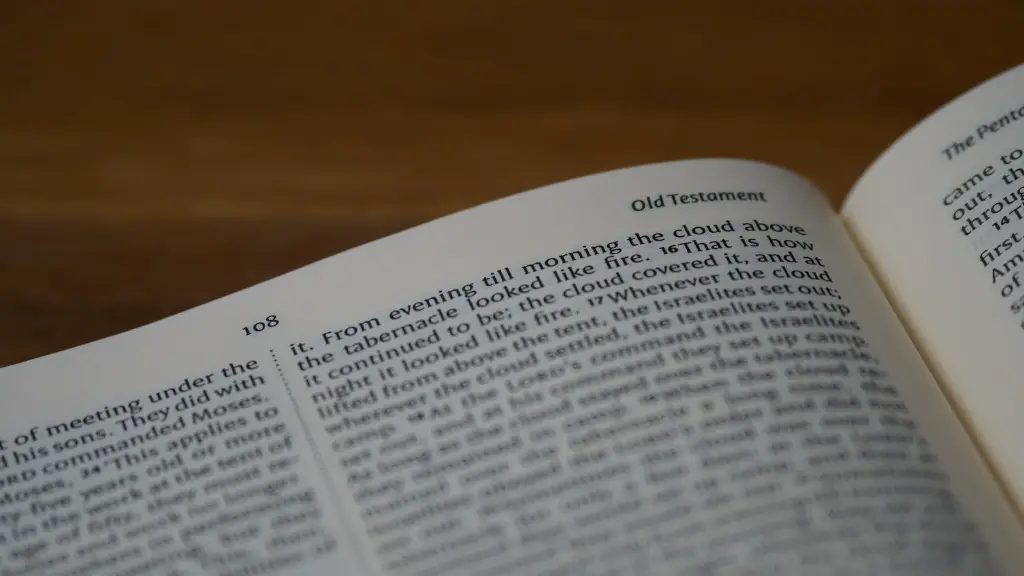Providence is an old spiritual concept that appears frequently in the Bible. It is often used interchangeably with the term “divine providence,” which is defined as “God’s protecting care and guidance of the world, especially in its moral and spiritual affairs.” When used this way, providence often implies that God makes sure that everything will turn out the way it should and that He watches over all things.
But the concept of providence in the Bible goes beyond this general definition.The Bible states that providence is not only God’s oversight but that he is actively involved in our lives.God’s providence includes his guidance, intervention, and judgment. He directs us to do the right thing and to perform His will, he intervenes when necessary, and he judges us when we are unrighteous.
The Bible teaches that God is always aware of everything that is happening and that his providence is ultimately for our benefit. In Proverbs 16:9, it states “The heart of man plans his way, but the LORD establishes his steps.” God has appointed us to be wise and prudent, but he ultimately controls all the events in our lives. Secondly, the Bible teaches that God’s providence is both wise and good. He knows the future and acts graciously to bring it about. For example, in Deuteronomy 8:18, it states “You shall remember the LORD your God, for it is he who gives you power to get wealth.” Here, God has promised to provide for his people and to help them succeed.
However, the concept of providence in the Bible is not simply a passive, uninvolved force. It states that God is actively involved in the lives of his people. He guides us, intervenes when necessary, and judges us when we are wrong. This active providence is most clearly expressed in Jesus. He perfectly expressed the devotion and love of God and demonstrated his willingness to make any sacrifice for those who love him. In John 3:16, Jesus states “ For God so loved the world, that he gave his only son, that whoever believes in him should not perish but have eternal life.” Here, Jesus exemplifies the sacrificial nature of God’s providence.
God’s Sovereignty
The concept of providence in the Bible includes God’s sovereignty. This means that God is the ultimate authority and power in the universe. He has the power to make his will known and to bring it to pass. In Romans 9:20-21, the Bible says “But who are you, O man, to answer back to God? Will what is molded say to its molder, ‘Why have you made me like this?’ Has the potter no right over the clay to make out of the same lump one vessel for honorable use and another for dishonorable use?” Here, we can see that God has the ultimate authority to do as he wills.
The Bible also teaches that because God is sovereign, any good that comes into our lives happens because of his mercy and grace. In Romans 8:28, the Bible states “ and we know that for those who love God all things work together for good, for those who are called according to his purpose.” Here, God displays his sovereignty by showing that he has control over all things and can work them together in a way that ultimately brings good into our lives.
Finally, the Bible teaches that God’s sovereignty should be a source of comfort in the midst of tragedy and sorrow. He is ultimately in control of all things and can bring good out of the most difficult of circumstances. In Isaiah 55:8, it states “For my thoughts are not your thoughts, neither are your ways my ways, declares the LORD.” Here, God is reminding us that his plans are different from ours and ultimately, better.
God’s Involvement In Our Lives
The concept of providence in the Bible also includes God’s involvement in our lives. The Bible teaches us that God is intimately involved in every aspect of our lives, providing guidance and protection at every turn. In Proverbs 3:6, the Bible states “In all your ways acknowledge him, and he will make straight your paths.” Here, we can see that God is always aware of what is happening in our lives and is actively guiding us to make sure that the paths we take are the right ones.
God also promises that if we trust in him, he will take care of us. In 1 Peter 5:7, it states “ Casting all your anxieties on him, because he cares for you.” Here, we can see that God is not only aware of our struggles, but also cares deeply for us, and wants us to rely on him for comfort and strength.
The Bible also teaches that when we trust in God’s providence, he uses all the events in our lives to bring good out of them. In Romans 8:28, the Bible states “And we know that for those who love God all things work together for good, for those who are called according to his purpose.” Here, we can see that God is actively involved in our lives, orchestrating events in order to bring about’good’ out of every situation.
Finally, the Bible teaches us that God also uses his providence to judge us and to call us to repentance. God’s judgment is meant to be a corrective measure, guiding us to turn back to him and away from sinful behavior. In Ezekiel 18:32, the Bible states “ For I have no pleasure in the death of anyone, declares the Lord GOD; so turn, and live.” Here, God is both using his providence to judge our actions and to call us to repentance.
God’s Final Purpose For Us
The concept of providence in the Bible is ultimately about God’s final purpose for us. In Ephesians 1:11, it states “In him we have obtained an inheritance, having been predestined according to the purpose of him who works all things according to the counsel of his will.” Here, we can see that God has a grand plan for our lives and is actively working to bring this plan to fruition in spite of our imperfections and weaknesses. God’s providence is a reminder that he will work all things together for the good of those who love him.
The Bible also teaches that God’s providence helps us understand our purpose in life. In Romans 12:2, it states “Do not be conformed to this world, but be transformed by the renewal of your mind, that by testing you may discern what is the will of God, what is good and acceptable and perfect.” Here, we can see that God’s providence helps us to recognize our true purpose and to conform to God’s will and plan for our lives.
Finally, the Bible teaches us that our ultimate purpose is to seek and to glorify God. In Isaiah 43:7, it states “everyone who is called by my name, whom I created for my glory, whom I formed and made.” Here, we can see that our purpose is to seek God and to honor him with our lives.
Conclusion
In conclusion, the concept of providence in the Bible is an important one that teaches us a great deal about God and his relationship to us. We learn that God is sovereign, yet intimately involved in our lives. He actively provides guidance, protection, and judgment, and his ultimate purpose for us is to seek and to glorify him. Ultimately, God’s providence is meant to remind us that we can trust in and rely on him, no matter what happens in our lives.



